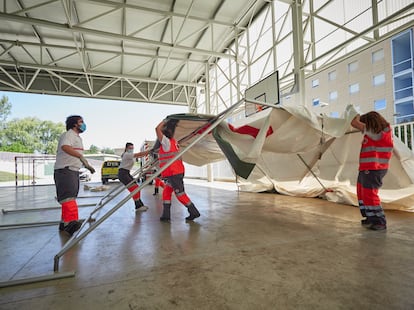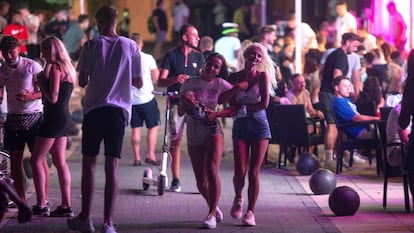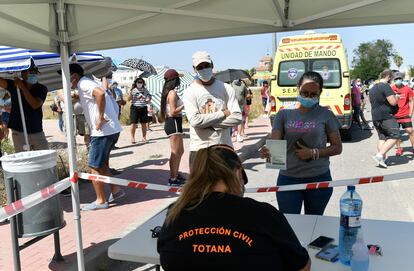Spain records highest daily rise in coronavirus cases since May 8
Norway will impose a quarantine on travelers and France has asked its citizens not to go to Catalonia


Spain has recorded its highest daily rise in new coronavirus cases since the beginning of the deescalation process, with 971 infections detected in 24 hours on Thursday, compared to Wednesday’s figure of 730. According to the latest figures from the Spanish Health Ministry, which now only offers disaggregated data from Monday to Friday, the daily rise of 241 new cases is the largest increase recorded since May 8, when the government began to roll back its coronavirus lockdown rules.
Replying to media questions at a government press conference on Thursday, María José Sierra, from the Health Ministry’s Coordination Center for Health Alerts, said: “This may already be a second wave.”
France on Friday recommended not traveling to Catalonia due to the surge in cases there. “We strongly urge French citizens to avoid traveling to that territory until the health situation there improves,” said Prime Minister Jean Castex on Friday.
And Norway will impose a 10-day quarantine on travelers from Spain starting on Saturday due to the spike in cases, the Norwegian government said on Friday. The Spanish Foreign Ministry has published a list of countries currently applying restrictions on travelers from Spain (updated before Norway made its announcement).
✈🚫 Restricciones a los viajes de ciudadanos provenientes de #España ⤵️
— Ministerio de Asuntos Exteriores, UE y Cooperación (@MAECgob) July 24, 2020
ℹ️ Consulta en nuestra web la lista actualizada a las 14:45 horas de hoy:
➡️ https://t.co/jwj4h35eJJ pic.twitter.com/HCB0J2atCT
No new lockdown “in theory”
Defense Minister Margarita Robles said on Friday that “in theory” there are no plans to decree a new national state of alarm like the one that kept people mostly confined to their homes for three months between March and June.
Instead, Robles said that the government wants to “support the work” of regional authorities in their own fight against the spread and effects of Covid-19. In an interview on the private television network Antena 3, the minister also asked authorities in regions experiencing significant transmission spikes to “reflect” on their own management of the crisis.
Without mentioning the Catalan government specifically, Robles recalled that some regional authorities harshly criticized the central executive for its handling of the crisis earlier this year, claiming that things would be different when they got their powers back. But “we are now seeing that it’s not that easy or simple,” she said.
Rise across Spain
The rise in coronavirus cases is being felt across Spain, with the cumulative incidence of the virus tripling in the past two weeks. According to Thursday’s report, the Spanish regions of Aragón and Catalonia recorded the highest number of new Covid-19 infections, with 415 and 182, respectively. Both regions have recorded community transmission of the virus: in Lleida province and Barcelona city in Catalonia, and in Zaragoza province in Aragón. Sierra described the situation in these two areas as “the most delicate,” although in Lleida the number of new cases has begun to stabilize.
Madrid also saw a rise in daily coronavirus infections, with the figure jumping from 70 on Wednesday to 102. Meanwhile in Navarre, where regional authorities have introduced new lockdown rules in a neighborhood of Pamplona due to a large Covid-19 outbreak, the number of new cases was half – 66 on Thursday, compared to 132 the day before.

The age of new coronavirus cases continues to fall as outbreaks at parties and nighttime venues lead to more infections among young people. A few days ago, the average age was 48, and by Tuesday it had dropped to 45. Sierra, however, warned on Thursday that a “certain upwards trend” in cases has been detected among people over the age of 60. This trend is of concern to the Health Ministry, given patients in this age group are at greater risk of experiencing complications. “We are worried because age is the factor most closely associated with the severity [of the disease],” said Sierra.
The health official also referred to the strain felt by primary healthcare centers, which are working with a skeleton staff while facing an increase in suspected Covid-19 cases, as well as patients with other problems. “We have to strengthen primary healthcare. There is more pressure on them than on hospitals,” said Sierra.
According to the latest data, hospital and intensive care admissions remain low, with 296 and 15 recorded in the past seven days, respectively. Seven people have died from Covid-19 in the past week, bringing the total to 28,429.
Higher positivity rate
An important indicator for understanding the evolution of the pandemic is the percentage of PCR tests on suspected cases that come back positive, a figure known as the positivity rate. A low figure is good news, because it indicates that only a few infections are being detected despite a large number of tests being carried out. This figure, however, has increased in the last week from 4% to 7%.
Although the central Health Ministry has the positivity rate of each region, it has decided not to provide this information to the press. When probed by journalists on Thursday, Sierra only gave a few examples, explaining that it was around 1% and 2% in Basque Country, and between 15% and 20% in Catalonia and Aragón.
According to the latest figures, there have been 369 coronavirus outbreaks since the end of the deescalation process, with more than 5,000 related cases. Of this figure, 281 outbreaks remain active, said Sierra – 57 more than on Wednesday. More than 70% involve 10 infections or fewer. The larger outbreaks, with more than 100 related cases, are connected to social settings and vulnerable workers, she added.
Imported cases
The number of imported cases, i.e. people who contracted the virus outside of Spain, is also of concern, as they are very difficult to detect, explained Sierra, because many do not have symptoms when they arrive.
In a bid to stop imported cases, the premier of Madrid, Isabel Díaz Ayuso, has called for more controls to be introduced at the Adolfo Suárez Madrid-Barajas airport, an issue Sierra said “had not been ruled out.”
Madrid is the only region not to have made face masks obligatory in all public spaces regardless of whether social distancing can be respected, and it has also not proposed any restrictions on nightlife venues, which have become a hotspot for coronavirus outbreaks.
New order in Galicia
All visitors to Galicia who have been in an area with a “high incidence” of the coronavirus in the past 14 days must provide the regional government with their address and length of stay within 24 hours of arriving. That’s according to a new order that was approved Thursday by the regional government. The new rules, which come into effect next week, apply to both residents of Galicia and all other travelers. The list of high-risk areas will be updated by the regional health department every fortnight.
The premier of Galicia, Alberto Núñez Feijóo, who recently won his fourth absolute majority at the regional elections, said the measure was needed to protect the region from the risk of outside contagion, arguing Galicia has “one of the best epidemiological situations in Spain.” According to the latest figures, there are 163 active coronavirus cases in the region and eight patients in hospital.
Murcia introduces new lockdown rules

The regional government of Murcia has introduced new lockdown rules in the municipality of Totana, which is home to 35,000 people. The measures are aimed at curbing coronavirus infections after 55 cases, linked to a local bar, were recorded in the area.
The new rules restrict travel to and from Totana, unless residents are leaving for work, to go to a medical center of for reasons of force majeure; limit private social gatherings to 10 people; and reduce capacity at all establishments to 50%.
English version by Melissa Kitson.
Tu suscripción se está usando en otro dispositivo
¿Quieres añadir otro usuario a tu suscripción?
Si continúas leyendo en este dispositivo, no se podrá leer en el otro.
FlechaTu suscripción se está usando en otro dispositivo y solo puedes acceder a EL PAÍS desde un dispositivo a la vez.
Si quieres compartir tu cuenta, cambia tu suscripción a la modalidad Premium, así podrás añadir otro usuario. Cada uno accederá con su propia cuenta de email, lo que os permitirá personalizar vuestra experiencia en EL PAÍS.
¿Tienes una suscripción de empresa? Accede aquí para contratar más cuentas.
En el caso de no saber quién está usando tu cuenta, te recomendamos cambiar tu contraseña aquí.
Si decides continuar compartiendo tu cuenta, este mensaje se mostrará en tu dispositivo y en el de la otra persona que está usando tu cuenta de forma indefinida, afectando a tu experiencia de lectura. Puedes consultar aquí los términos y condiciones de la suscripción digital.








































